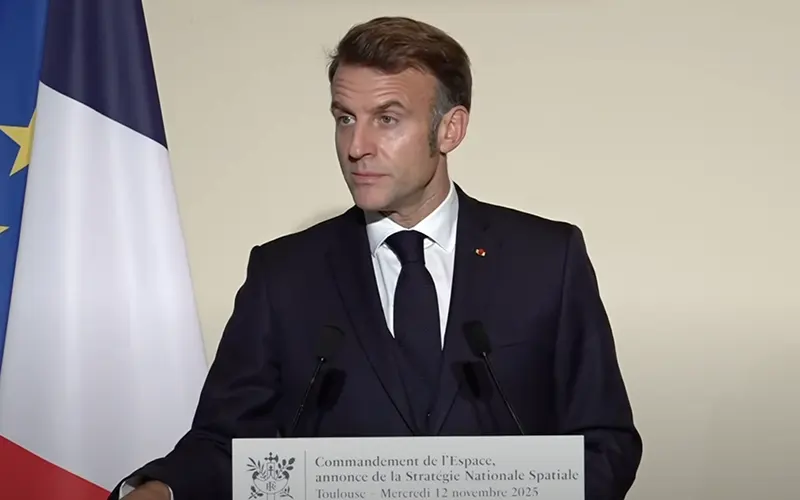 Credit: Élysée Palace
Credit: Élysée Palace
At the inauguration of France’s first Space Command facility in Toulouse on Wednesday, President Emmanuel Macron unveiled a new national space strategy defining the country’s civil and military priorities.
Macron opened his speech with a stark warning, declaring that “space is no longer a sanctuary; it has become a battlefield.” He warned that “aggressive powers have multiplied irresponsible, illegal and even hostile actions at the highest levels, just as they have done here on Earth.”
“Our competitors are not waiting for us and now possess the capabilities to act in and toward space, particularly through directed-energy weapons, including lasers, deployed on Earth,” said Macron. “These actions are not hypothetical; they are realities. They aim to deprive us of our freedom of action, to weaken our sovereignty, and to challenge our operational superiority. Faced with this threat, France is acting with a clear strategy: resilience, responsiveness, and the ability to act in and toward space.”
On the budgetary side, President Macron announced increased spending in both the country’s military and civil space programmes.
France’s current military budget allocates approximately €6 billion to space-related defence projects for the 2024–2030 period. During his speech, President Macron announced an additional €4.2 billion for 2026–2030, a roughly 70 percent increase that brings the total planned military space budget to around €10.2 billion.
While civil spending figures are less clearly defined, France currently invests an estimated €2.3 to €2.4 billion per year in its civil space programme. Macron has proposed total civil spending of €16 billion between now and 2030, representing an increase of roughly 30 to 40 percent over current levels.
As for policy, Macron stated that “France and Europe will not simply submit to rules imposed by others. We will write them with our European allies to preserve our freedom of access and action in, to, and from space.” He added that to remain a space power, France must also remain an independent one.
To this end, Macron outlined a series of priorities aimed at strengthening France’s ability to operate in an increasingly complex and contested environment. He emphasised greater resilience across national space systems, ensuring operational autonomy through the continued operation and reinforcement of existing sovereign capabilities such as Syracuse, CSO, and Ceres, and adapting to new requirements through more diversified orbital architectures, including the use of very low Earth orbit.
He also highlighted the need to expand France’s capacity to monitor its air and space environment, referring to the country’s future surveillance systems, and stressed the importance of developing active defence capabilities. Within this field, he identified the deployment, starting in 2027, of France’s first patrol-inspector satellites, Orbit Guard and Toutatis, as well as the integration of directed-energy technologies, including lasers and jammers.
Beyond defence, Macron detailed the broader pillars of the national space strategy. The first focuses on guaranteed access to space, with an emphasis on sustaining and increasing the launch cadence of Ariane 6, improving its competitiveness, and modernising the Guiana Space Centre, including the redevelopment of the Diamant and Soyuz launch pads.
A second pillar centres on industry and skills, calling for a reorganisation of France’s space industrial base to align with global markets and strengthen innovation, particularly through the start-ups supported under the France 2030 initiative. This will be supported by a long-term national skills policy looking ahead to 2040.
The third pillar covers science and exploration, which Macron said must be maintained and strengthened, highlighting France’s and Europe’s roles in climate monitoring and calling for greater ambition in areas such as cargo transport and on-orbit energy production.
Finally, Macron emphasised international cooperation, which he framed as a balance between partnerships and sovereignty. He underscored Europe as the primary framework for French space policy while also pointing to key strategic partners, including India, Japan, the United States, and the United Arab Emirates.
Keep European Spaceflight Independent
Your donation will help European Spaceflight to continue digging into the stories others miss. Every euro keeps our reporting alive.
